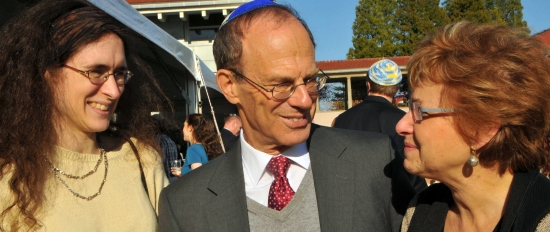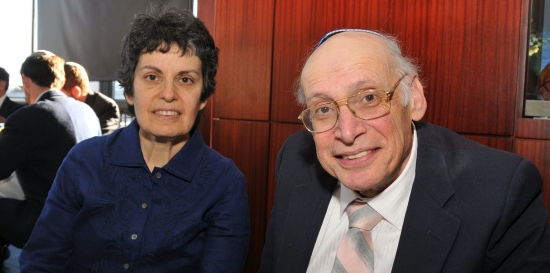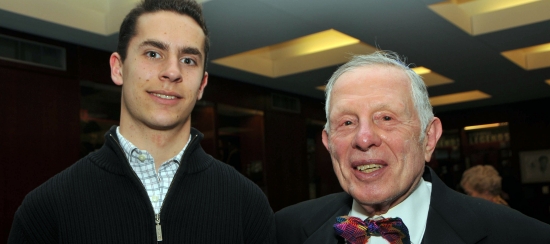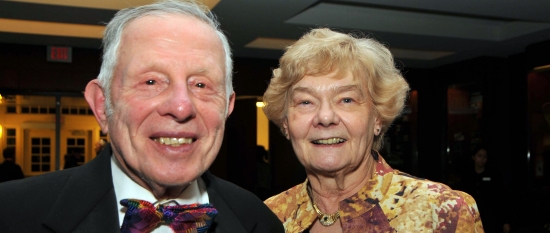
Sarah Grace Victor |

Dr. Mark Saperstein with wife
Tamar and daughter Sarah |

Uri Possen and Rhoda |

Norman Turkish and Yale
Herskowitz |

Norman Turkish and Sara Beth Canaday |

Norman Turkish, Alfred C. Snider
and Rabbi Maurice Kaprow |

Kim Greene-Konneh, vice consul
general of Liberia (left), with Mr. and Mrs. Gould |
CORNELL
Student Sermon Contest Proves
It Has A Role To Play In Society
STORY AND PHOTOS BY TIM BOXER
ARAH GRACE VICTOR, born in
Philadelphia to Christian parents from India, is the winner of the
second annual Harold I. Saperstein Cornell Student Sermon Contest.
The competition, based on the Hebrew Bible, was open to all students
on campus. Victor emerged victorious over 30 contestants.
Cornell alumnus (class of 1956) and
philanthropist Norman Turkish created the competition in
memory of Harold I. Saperstein (class of 1931), a Reform rabbi famed
for his ardent sermons on social justice and spiritual leader for
half a century at Temple Emanu-El of Lynbrook, N.Y., until retiring
in 1980.
A student at the university’s School of
Industrial and Labor Relations, Sarah Grace was awarded a $1,800
check at a kosher dinner in April at Cornell University in Ithaca,
N.Y.
Saperstein’s son, Marc, a former
principal of the Leo Baeck College in London, wondered if the era of
the great orators of Abba Hillel Silver and Stephen Wise
can be revived. He recalled a recent debate at Cambridge, England,
whether we should stop referring to pulpit remarks as a sermon but
as "dvar Torah."
"I hope," he said, "that we will be
convinced tonight that the sermon has a role to play."
There are three important elements of a
speech or sermon Barry C. Black, chaplain of the United
States Senate, told me. The first is delivery, the second is
delivery, and the third is delivery.
Sarah Grace Victor, 19, delivered to a
standing ovation. Among those applauding was Maurice S.
Kaprow, former spiritual leader at Williamsburg Jewish
Congregation in Orlando and currently a member of Greater Orlando
Board of Rabbis and treasurer of the National Association of Jewish
Chaplains.
In an interview Sarah Grace told me she’s
going to Israel this summer to analyze business disability policies
of American companies based there.
She focused her topical sermon on a young
woman who faced a choice we make every day: Would she stand up for
someone else when it personally cost her something? Would she go to
the king to plead for the life of a people that faced extermination,
knowing that to approach the throne uninvited meant certain death?
Sarah Grace used the story of Esther to
establish a clarion cry for "personal action that jeopardizes our
comfort, even our lives, personal action that recognizes the
influence of a higher power that can direct our steps."
She cited the 56 signers of the
Declaration of Independence as examples of individuals who pledged
their lives, their fortunes and their sacred honor to establish a
free nation. Nine gave their lives in the Revolutionary War, while
12 lost their homes and property.
Dr. Turkish dedicated this year’s contest
in honor of the late Milton Konvitz. Born in Safed to a
rabbi, he became a constitutional lawyer, social critic, Cornell law
school professor and founding faculty member of Cornell’s School of
Industrial and Labor Relations. The former ILR dean, David
Lipskey, credited Konvitz with coining the phrase "civil
liberties."
The New York vice consul general of
Liberia, Kim Greene Konneh, told how Konvitz worked with the
chief justice of her country to establish a legal code. "The
government of Liberia," she said, "will always remember the white
man with the bow tie who was the first to codify their laws."
Alfred C. Snider, professor of
forensics at the University of Vermont and director of the World
Debate Institute, said he’s a great fan of sermons which "replace
weapons with words." He finds sermons "fabulous examples of using
communication to make the world a better place."
He said he studies television evangelists
and has picked up their technique. "But I’ve not raised the money
they make – partly because I have a conscience."